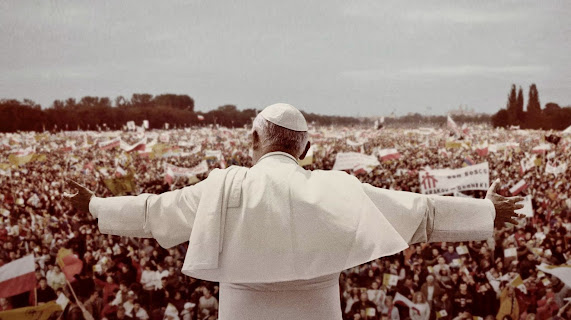Establishing the Basis for Authentic Human Inter-Subjectivity - "Participation or Alienation" by Karol Wojtyla
Participation or Alienation?
Participation or alienation? What does this phrase mean? Well "alienation" was a key concept developed by Marx in order to express what the Theist and Capitalist worldview does the human person. It hinders the authentic self and actualization of the person, in Marx's eyes. Therefore, those structures which do this must be torn down. The problem is that in Marxist philosophy, participation, that is the authentic flourishing of people together, has no concern for the individual, only for the collective "humanity." And in the name of this collective, any number of atrocities may be committed against the individual. Here enters Karol Wojtyla, later known as Pope John Paul II. Having experienced the oppression of both the Nazis and Communists in Poland, he is seeking to reevaluate these terms. What does it mean to authentically "participate" in society, in relationship with others? What is true "alienation"? This essay tries to lay a few principles by which Wojtyla reestablishes the fundamental importance of the individual person in face of the dominating and destructive collective ideologies which he lived through.
Introduction
In the more immediate context, this is a short essay given by Karol Wojtyla at a philosophical conference on Phenomenology in 1975 at the University of Fribourg. At the beginning of the presentation he mentions that he is going to hit two major topics. First he wants to address what it means to love one's neighbor, but from the perspective of the Personalistic school of thought on action. This, he says, will involve a novel understanding of the idea of what a "neighbor" is. Secondly, he is going to relate this idea of love against the Marxist concept of the "alienation" of the human person. 1
A key theme is the exploration of Personalistic action is that of the relationship of the "I-Thou." Wojtyla explains that all human knowledge and experience is shaped not just by consciousness of a physical world, but of the perception of the world through the lens of the self-consciousness of the person. It's an experience of the world always shaped by the person's individual understanding of themselves in that world, their "I". Likewise, the I is always shaped by the relationship and knowledge of other I's, of other people in my experience. One cannot understand reality without understanding that reality is experience as a personal agent in the world of other personal agents.
The "I" and the "Other"
The person is categorically represented through the existence of themselves as an "I". 2 But Wojtyla holds that it is through action, though, that the I is developed. It is through action that the potential of the person to become this type of person or that type of person is actualized. This is the idea of "self-determination." Through our actions we determine what type of person we become. 3 "Through the aspect of the self-determination manifested in my action, I who am the subject of that action discover and simultaneously confirm myself as a person in possession of myself. To the essence of my I, or self, belongs not just self-consciousness, but more importantly self-possession." 4 So in determining what type of person we become we are also simultaneously getting in touch with that person.
Fundamentally, the other is that which is beyond my personal experience of the world as a self-aware and determining agent. I do not have access to the other in the way that I have access to myself. 5 Yet, when it comes to other persons, I can know that they are beings similar to me, they are self-conscious and determining I's as well connected to me in my experience.
Defining Authentic "Participation"
Here Wojtyla introduces us to his original notion of "participation" which he formulated in another work, The Acting Person. He says that participation is 6 "...namely, the ability to exist and act together with others in such a way that in this existing and acting we remain ourselves and actualize ourselves, which means our own I's." 7 In other words, how is it that we live together with others in this world and respect the dignity which is inherent to each individual actor as a locus of personhood? [Why does this question matter, even? Well we are going to see that Marxism and Nazism explicitly try to eradicate the notion of the inherent dignity of the person in favor of collectivist philosophies, thus Wojtyla starts at the very bottom in grounding the reality and dignity of the individual.] Participation, goes deeper, Wojtyla says in that through the realm of real experience I not only recognize that the other person is like me, personal subject, but that through our interactions, "participation," our I's are intertwined ... and we share in the very nature of being human beings together, we become "neighbors." 8 Again, participation is not just to know that the other is a person like you, but to form a relation to that other by "...consciously becoming closer to another" in real life. To form a relationship that is an "I-Other relationship," one that is "...always interhuman, unique and unrepeatable in each and every instance...". 9
To actualize the potential for this interhuman participation with another, one must enter into knowledge of the person's experience and the actions that the person has taken in formulating their own self. Why? Well it is only through our ability to experience the world in a self-reflective manner, as an I, which allows us to then determine what type of person I will become through my conscious actions. Therefore, that is the depth of the concrete person, that experience and choices which have made of their being. 10 "When I experience another as a person, I come as close as I can to what determines the other's I as the unique and unrepeatable reality of that human being." 11
Living Out Authentic "Participation"
To authentically participate in another's life, to for that interpersonal relationship, requires work. It is a task to be actualized, not something that automatically takes place. While being commanded from without, by the Gospel, it is also something which arises from within a person, both emotionally, but also as something experienced and desired as a fundamental human good, being in community with others. Most fundamentally, though, it means to choose to be involved with another particular human being. 12 To will the other person who is given to me in these circumstances "here and now." When this willing of the other flourishes, it turns into a "communion of persons." It moves from an I-Other relationship to an "I-Thou" relationship. 13 Another way of getting at this is to look at it through the negative lens. When someone experiences a negative relationship with another, one of hatred or whatever, it becomes clear how deeply that other individual has entered into one's own reality. 14 "Perhaps these negative feelings or attitudes bring into even sharper relief the very elementary reality of my participation in the humanity of the other and reveal how deeply I am bound - inwardly bound - to that person in myself. The Gospel also suggests this by using not the word others but the word "neighbor." 15
Marxist "Alienation"
As a contrast to authentic participation in the lives of others, Wojtyla brings up the Marxist idea of "alienation." Karl Marx proposed that man is alienated from himself, is stripped of his proper actualization as man, when the structures of society around him pervert the true meaning of his life. For example, when man is told that he is to live for Heaven, this alienates him from (what Marx sees as) his true meaning of living the utopia in this life on earth. 16 Here we see a shift, from a focus on how man treats and interacts with one another on an individual level, to a view of humanity and its structures on a collective level. Wojtlya claims that what is essential is what takes place between people on an individual level. 17 "We know, for example, that in the concentration camps there were people who managed to relate to others as I', as neighbors - often to a heroic degree." 18
Fixing the larger structures of alienation requires that we first go to its root, the way we interact with others individually. And this is the fundamental question we must ask of society. Is it set up as to facilitate the authentic participation of people into each other's lives in the I-Thou relationship? Or does it force us to deny the shared humanity of the other? 19 "Do they obstruct participation and ravage and destroy this basic fabric of human existence and activity, which must always be realized in common with others?" 20 Alienation, after all, is the negation of personal participation with others in my life. It is to destroy the possibility of relationship between people. 21
----------------
1 - Wojtyla, Karol. Catholic Thought From Lublin: Person and Community Selected Essays. "Participation or Alienation". Pg 197.
2 - 198
3 - 199
4 - 199
5 - 199
6 - 200
7 - 200
8 - 200
9 - 201
10 - 202
11 - 202
12 - 203
13 - 204
14 - 205
15 - 205
16 - 206
17 - 206
18 - 206
19 - 206
20 - 206
21 - 206







Comments
Post a Comment